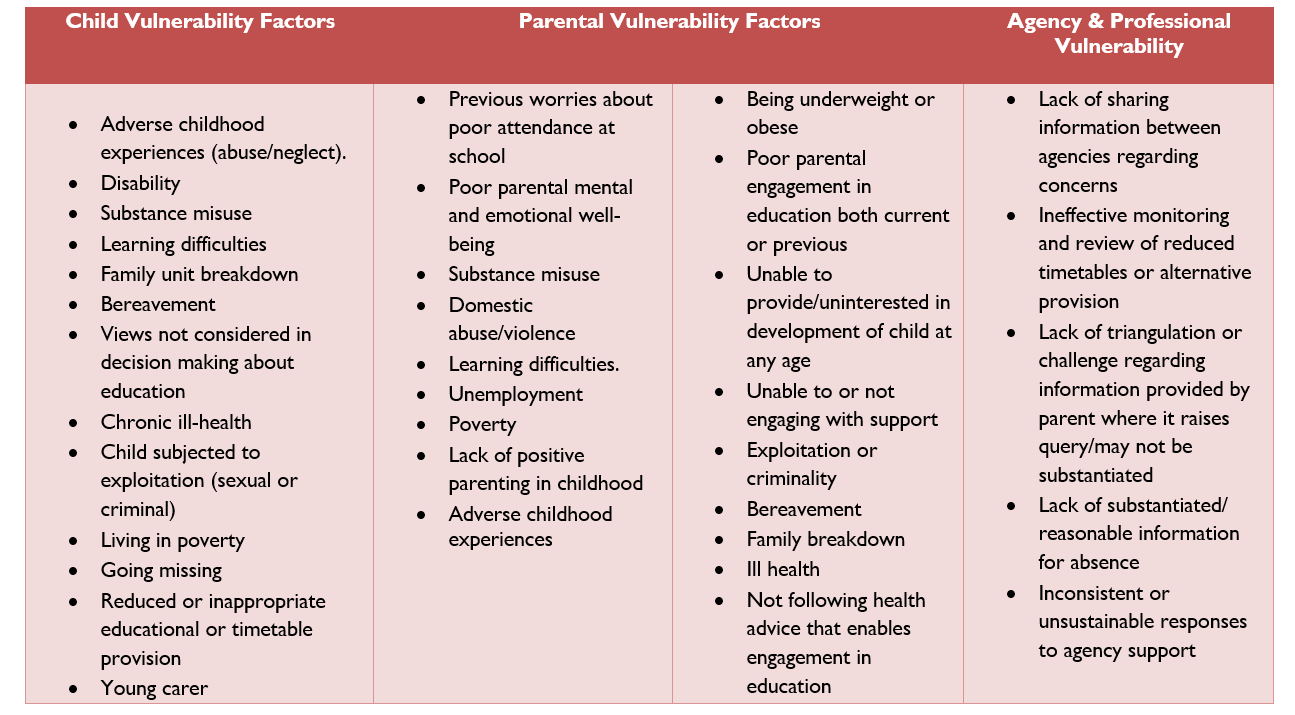What do we mean by ‘educational neglect’?
Education is essential for children’s progress, wellbeing and wider development and being in school is a protective factor against wider harms, including exploitation.
Working Together 2023 recognises the particular importance of engagement in education:
‘All children aged 5 to 16 are legally entitled to a full-time education, suitable to any
special educational need……. Where children are not receiving education, either because they persistently miss school, or are not registered at a school and not receiving a suitable education otherwise, this could be a possible indicator of neglect, abuse or exploitation or could in itself constitute neglect in severe and sustained cases.’
Educational neglect can take place in a number of ways and both parents/carers and we as professionals can play a part in a child’s experience. Described below are examples of how children’s education can be neglected which can be one or more of the following:

Parental/Carer Neglect
1. Parents/carers not or unable to identify provision or adequately maintaining schooling/education provision.
2. Parents/carers not or unable to engage in most school, Local Authority or Academy Trust meetings – even where support is offered – that leads to a disengagement of a child in their schooling with a detrimental impact on their development.
3. Parents/carers not or unable to engage as required with agencies and support beyond school, for example health services, and where this leads to a delay or deterioration in their child’s development, taking into account of a child’s needs.
4. Parents/carers not providing substantiated reasons for absences from school.
5. At least one court intervention which doesn’t lead to improved attendance.
6. Parents/carers unable to/not making use of support for an identified need that is likely to have led to an improvement in educational development.
When considering parental educational neglect, it is important to take into account a parent’s own experience of education.
It may be acting as a barrier to supporting their child’s own individual educational journey and be further contributing to the child’s needs not being met.

Professional/System Neglect
1. Not reporting concerns that require additional intervention to avoid serious impairment of a child’s development.
2. An Alternative to full time education not provided/not in line with needs/ not monitored effectively or changed/adapted to reduce the serious impairment of educational development, taking into account an individual child’s needs and wishes.
3. Transfer of records or known information that supports a child’s developmental needs, including social, emotional, mental health and well-being and learning needs are not shared with other professionals or transferred to new settings in a timely manner.
4. A child ‘off-rolled’ from school and not following correct process or off-rolled in the best interests of the school but not the child. Ofsted define ‘off-rolling’ as; “The practice of removing a pupil from the school roll without a formal, permanent exclusion or by encouraging a parent to remove their child from the school roll, when the removal is primarily in the interests of the school rather than in the best interests of the pupil”. It is lawful to off-roll, but this must be in the best interests of the child and follow due process.
5. Not taking timely action to minimise the impact of known /recognised poor parental management of educational attendance or provision.
6. Not putting in place in a timely manner, or sufficiently accounting for health professionals advise to establish an Individual Health Care Plan.
Let’s take a closer look at vulnerability and protective factors…..


Questions to ask ourselves….
Let’s all help each other as a system of support to ensure educational neglect is featuring in our practice and responses with children and families. We can do this by asking ourselves…..

Are the child’s educational development needs being met and is this in line with expected learning milestones nationally for all children?
Are learning needs being addressed so that learning and educational progress can be seen appropriate to identified needs?
Are there aspects of the provision that are impacting negatively on the educational development of the child?
Is a full-time education offer in place?
Has each child in a family had an application made for a school place or a parental decision to Electively Home Educate been made?
Have I notified other local authority teams/agencies who may be able to support a young person e.g. if post-16 or any additional needs?
A few more practice considerations…….
1
Achievable & Timely
Where needed set appropriate, achievable steps within a clear timeframe in addressing the health, well-being and educational needs being discussed. Parents usually want the best for their child and so ensure they are supported to achieve this at the earliest possible opportunity with engagement through individual organisation teams and Early Help support. Where parents are not supporting the educational learning and development of their child this should be clearly recorded and the necessary steps taken to minimise the impact of this together with other professionals.
2
Observe, Engage & Support
It’s important in our support of children to observe how they are presenting and understand how they are showing us what’s going on for them. Be descriptive in your observations and explain phrases such as ‘child is dysregulated’ by describing the behaviours. A range of professionals’ perspectives may be required. Ensure the child’s voice is heard and give time for this to happen in a meaningful way.
3
It’s OK to be Curious & Challenge
It is expected and reasonable to challenge behaviour and provision with regard to a child’s educational needs, including transfer of records that appears may be neglectful. Be sensitive in any challenge of parents or professionals and record reasons for challenge and any outcome. Escalate where a child’s basic needs are often not met, explore with parents where children present in a manner that is different to that which is expected for every child, on all occasions. Different parenting styles can affect what expectations are manageable and understood, these can also be cultural differences therefore be sensitive and knowledgeable, but do not fail to challenge. It is possible that there may be other aspects of neglect that may cross over with educational neglect therefore clear recording is essential.
4
Review
Review a child in the context of their family and previous events or patterns. Record your thoughts and reasons for decisions, be professionally curious when safeguarding children and always consider their educational development in addition to other needs.
5
Discuss
Discuss children’s situations with another appropriate person, either a colleague or manager or raise your worries about a child’s education in existing meeting structures e.g. Early Help/Child in Need or Child Protection.
6
What Else is Going On?
Consider if there are previous or current worries about different parts of a child’s education such as but not limited to: exclusions (lawful or unlawful); children missing education – what has been discovered or looked in to and what actions have been taken; whether there is a full-time offer of education; whether there is a reduced timetable that is reviewed regularly and amended to support education need; whether there is a provision relative to needs that may be short or long term for medical needs; whether parents are fully aware of their responsibilities if removing a child to be electively home educated.
7
Transfer of Records
Always ensure that on any change of schools – at normal transition points or during the school year – that the records to facilitate the educational development of a child/young person are shared to ensure that the child will be supported appropriately from arrival. This should include any information that supports their attendance such as start of day arrangements that support arrival/settling in to school.
8
Check if Parents Understand and Agree
Ensure that where any change or reduction in an offer of full-time education is made that parents understand and agree with this in the interests of their child. Check that Plymouth City Council guidance for reduced timetables are followed and review is planned and regular.
…and finally…
Plymouth City Council has a clear policy and process for how children missing education, permanently excluded children and matters related to school attendance should be managed and escalated if unresolved, making clear for all when to follow different steps of intervention and involving all relevant agencies, including for social workers to engage with linked Access and Attendance Officers when pupil absence or arrangements for education are of concern. You kind find these below:
CHILDREN MISSING EDUCATION
REDUCED TIMETABLE GUIDANCE
SCHOOL EXCLUSION
